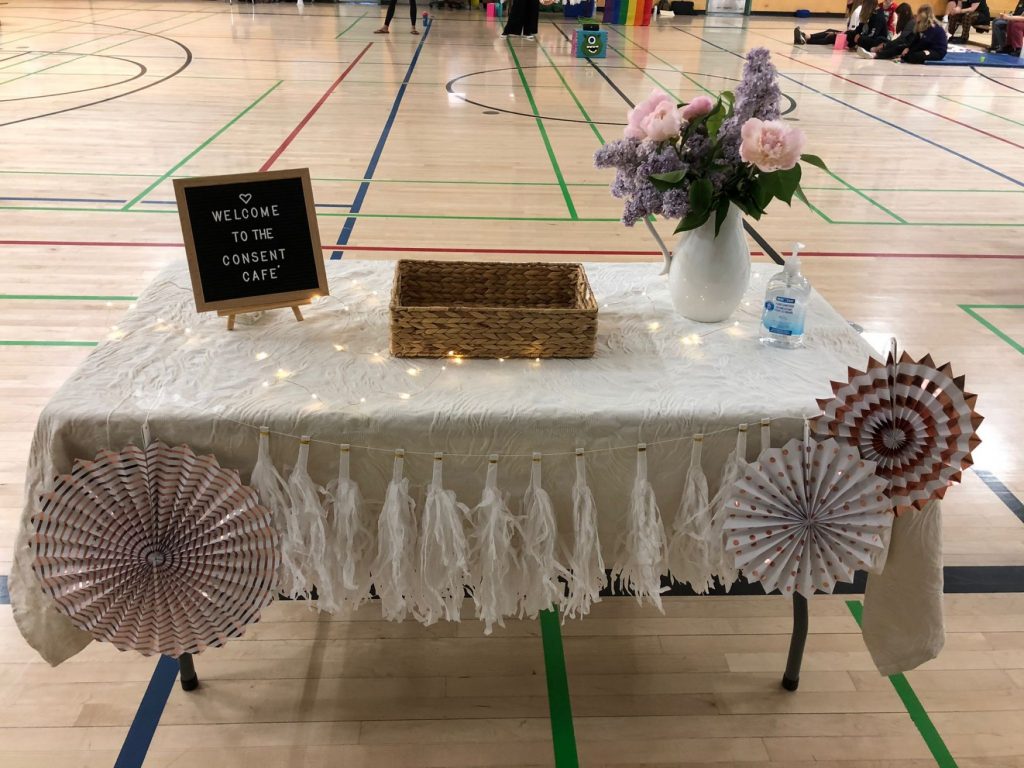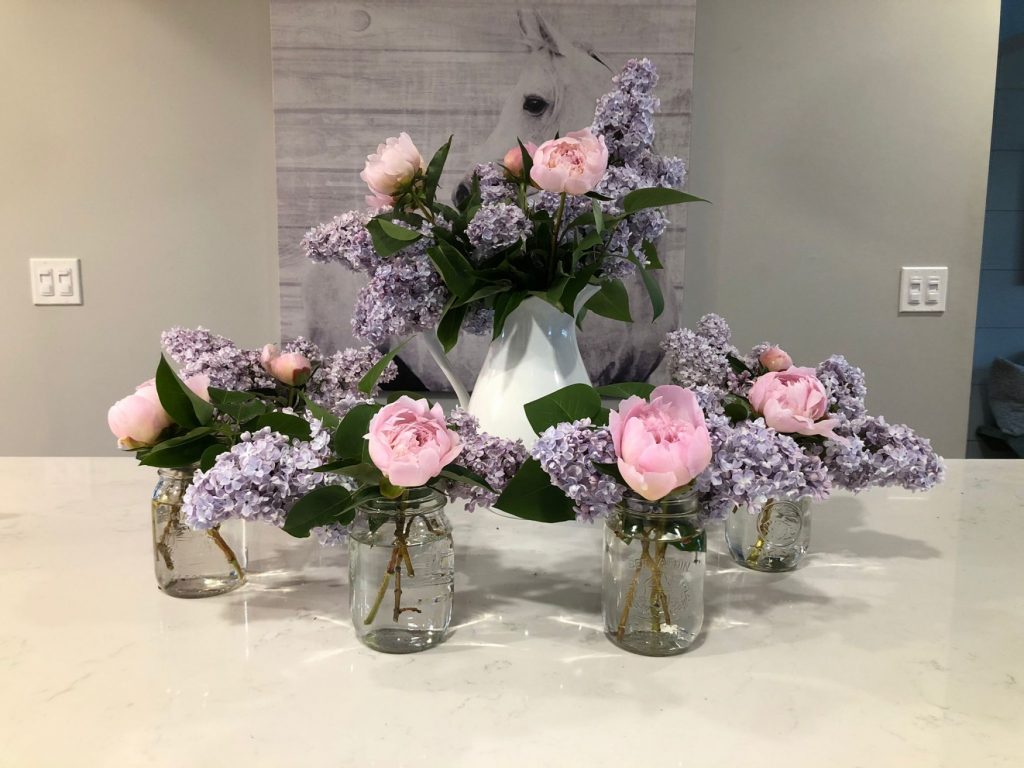Consent is an integral aspect of relationship building. Respecting boundaries, asking for permission and gaining a deeper understanding of comfort levels can undeniably benefit people’s lives through better communication, self-reflection and shared experiences with partners, friends, families, colleagues and neighbours (the list goes on and applies to all).
Coupled with an understanding that adolescence is a time of solid relationship building and self-actualization, the first-ever Consent Café was facilitated by the TRU Wellness Centre, Sexualized Violence Prevention and Response, Human Service (HUMS), as well as community partners such as Kamloops Sexual Assault Counselling Centre (KSACC) and School District 73. As a result, 86 students at Kamloops School of the Arts (KSA) participated on May 27 and 28. The TRU Wellness Centre received funding to lead this initiative from TRU’s 50th Anniversary Gift of Learning Fund.
The Consent Café was based on the annual Consent Tea, first conceived and facilitated by Wellness Centre Co-ordinator Chelsea Corsi after watching “Consent as a Cup of Tea.“
While Corsi acknowledges that the viral video doesn’t fully encompass all aspects of consent and rape culture, she saw an opportunity to create a safe space to speak openly about this complex issue. “When talking about a topic that is stigmatized, you have to start simple, and it’s a stepping-stone approach.”
With the help of the Student Wellness Ambassador Team and other campus and community supporters, Corsi has successfully facilitated five of six annual Consent Tea events, including a virtual offering in 2020.
Café goes to high school
Philippa Thiessen, a phys-ed teacher at KSA responsible for health and wellness learning outcomes in grades 8 and 9, met Corsi through a mutual friend. At that time, Corsi asked if Thiessen would be interested in piloting the event that Corsi had been working on alongside Tanya Pawliuk, a faculty member in Human Service (HUMS) and KSACC board president since May 2020.

Thiessen explains the value of having the Consent Café in a high school setting, saying, “It will have a very different feel at KSA, but I also think that these young students — after hearing what they are saying in my class and what they talk about in the hallways — need this information.”
Corsi describes the Consent Café as “an activity-based approach, geared to a youth audience, that offers opportunities to learn about consent, relationships, communication, sexualized violence, resistance and community/online supports.”
She said they use a small-group dialogue model to reduce learning barriers and create safety and inclusion with participants because sex and consent are hard to discuss.
Corsi notes that many local high-school students spend at least a year or two at TRU and that it’s crucial to provide space for these concepts before stepping foot on campus.
Educating starts early
“I believe that we as a community, both on and off-campus, must work together to provide consistent messaging about consent and relationships to nurture healthy interactions between partners and reduce the incidences of sexualized violence. This education must be provided early in the lives of children and must be consistent and ongoing throughout their development,” she says.
“This way, as young adults enter university, their literacy about these issues is congruent with what we expect at TRU. It is reinforced as they embark on the serious and complex relationships of adulthood. Also, rape culture is still so pervasive in our society. It is extremely harmful and needs to be dismantled brick by brick; this is one way I can take action.”
Pawliuk says, “We wanted to take what we know about consent on campus and bring that to students at an earlier age when it’s going to have meaningful growth opportunity instead of us just reacting.”

Alix Dolson, agency co-ordinator at the Kamloops Sexual Assault Counselling Centre (KSACC), says early prevention work supports community health and literacy.
“If conversations around consent aren’t starting until folks are in their 20s, then it’s too late. Most people have had sexual experiences by then and have already experienced their boundaries being breached by the time they get to university,” says Dolson.
While these conversations should start with children as early as toddlerhood, this isn’t always a reality or a possibility, she says. Therefore, educators and passionate preventionists can play the role of providing this education to the community.
Meaghan Hagerty, TRU’s Sexualized Violence Prevention and Response manager, explains the value of early intervention: “It’s like getting a new puppy; you want to teach them as much as possible while they’re young. Of course, you can always go back and correct and teach later, but it can be harder, and there can be some destructive things already built-in.”
Although events such as Consent Café aim to prevent and unpack problematic beliefs around consent before their development, it is impossible to completely block the influence of cultural norms and ideals that are largely ingrained in our shared stories and systems.
“We often talk about consent like it’s a clear thing — a yes or no that when someone asks for or provides it, you’ll know it for sure. However, the reality is that we rely primarily on non-verbal communication, and not everyone can accurately understand other people’s non-verbal responses,” Pawliuk says.
While events like Consent Café create a safe and accountable space to reflect on these nuances in a non-judgmental way, it’s important to note the long-standing and complex spectrum between the perpetrator of violence and the non-perpetrator of violence, says Dolson.
A safe space for learning
“Events like this can help us understand the pieces of the ways we act in the world and engage with other people, outside of what might be called a sexual assault, might perpetuate rape culture.”
Hagerty further illustrates how these safe spaces can take the onus off of the individual and allow for better learning opportunities as a collective.
“When you take the conversation around consent out of the context of sexualized violence, people suddenly become more able to see those ‘no’ cues and realize that they actually can see those signs, and they begin to make choices based on this learning after the fact,” she says.
Pawliuk explains: “The complexity lies with the uncertainty of ‘I don’t know’ or ‘I haven’t decided yet.’ This can feel unfamiliar to us, let alone the person we are engaging with, which is why it’s so important that we have these kinds of conversations. We grow this literacy within a relational context.”
After seeing the event, Thiessen says consent education would be an ongoing process, just as Rome was not built in a day. “My students recognized that there is much more sexual education information needed and that the foundation is consent.”
For more information about consent education at TRU, contact ccorsi@tru.ca.

